When Do Kids Learn About Money
"I just want my child to succeed," is probably something almost every parent has said at one time or another. And a big function of setting upward a solid foundation is past teaching your kids about money.
Now, you certainly don't take to get them investing when they're nonetheless in diapers. But the fact of the matter is, money kinda really does brand the earth get-'circular — and schools are only just starting to include basic fiscal skills into their curriculum. Chances are, your unabridged thou-12 school experience didn't cover the basics, let alone data like investing or mortgages.
Weaving money management lessons into everyday life can requite your kids a foundational agreement of concepts like saving and smart budgeting. Financial literacy, for the win!
Let's look at age-appropriate financial lessons for kids, and how yous tin integrate these into your daily activities.
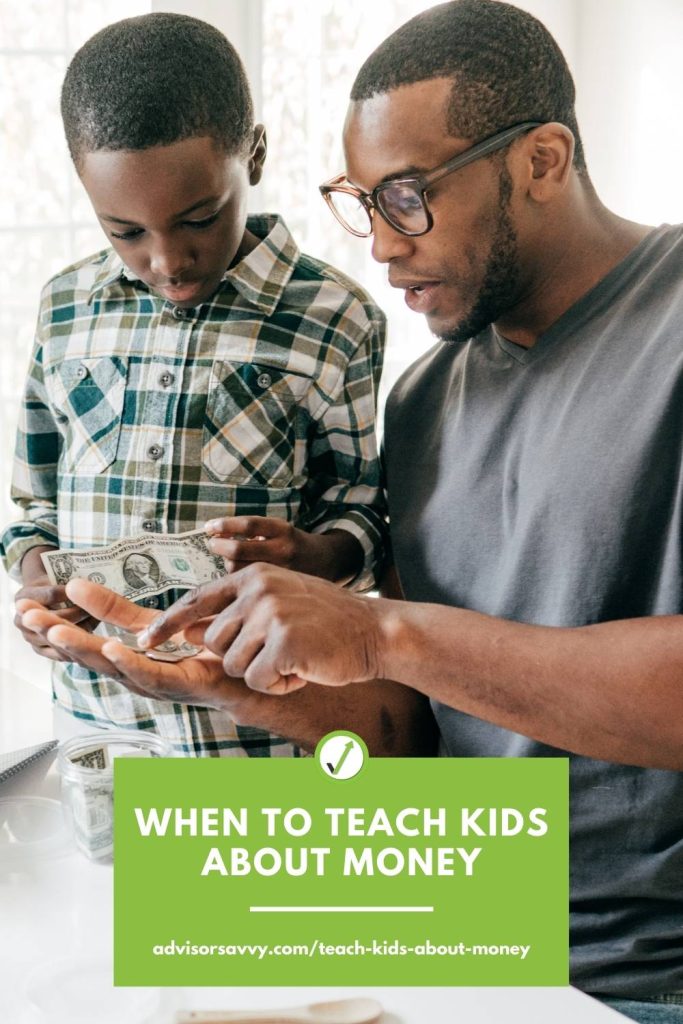
Table of contents
- What is financial literacy?
- Why is information technology important to teach kids about money?
- When to teach kids about money
- Money lessons during financial hardship
- How to teach your kids virtually money – Age by Age
- Pre-school and kindergarten
- Allowances
- Unproblematic and middle schoolhouse kids
- The truth about advertisement
- Loftier school students
- 'Money Talks' with teenagers
- University and college students/early on adulthood
- Pre-school and kindergarten
- How to salve upwardly money equally a child
- Recommended resource for teaching kids about coin
- Additional Resource
- Books to help parents teach kids about coin
- Takeaways
What is financial literacy?
The simplest definition of financial literacy? Knowing how to manage your coin. But y'all know how the concept of 'literacy' isn't just reading and writing but all aspects of how nosotros communicate and empathize each other? Well, the same coin direction tin can be broken down into a LOT of subtopics, and they all ladder upward from each other.
First, you have the basics similar saving and budgeting. And then, there's learning about donating and existence a smart consumer. Finally, you move into lessons on credit, investing, taxes, and long-term planning. Being financially literate as well includes concepts similar setting goals for yourself and learning nearly delayed gratification.
Ultimately, fiscal literacy is now considered an essential life skill.
Did you know? In Canada, every November is Financial Literacy Month. All month, the Fiscal Consumer Agency of Canada features instruction information and resources effectually a theme.
Why is it important to teach kids nigh money?
According to Beth Kobliner — an expert on personal finance for immature people — money habits are already prepare by age seven. At 3, kids can handle and understand bones coin concepts. Combine this with the fact that kids are basically sponges, picking upwards behaviours and cues quickly, it's of import to start these lessons early and weave them into all aspects of life. And, every bit the below video shows, money lessons can be fun — and involve things similar pizza!
And information technology's not simply about teaching these money foundations. It'due south likewise well-nigh making certain your kids are confident with money.
A recent survey from The Canada Life Balls Co. asked Canadians to rate their financial noesis. They were then quizzed on a multifariousness of financial topics. The boilerplate score? 71%. Meanwhile, 41% of respondents claimed high confidence in financial topics. Even though Canadians accept a fairly healthy baseline of financial cognition, there'southward a disconnect with their confidence in this cognition.
Teaching kids money nuts needs to get hand in hand with empowering them to make informed decisions for themselves. Even if they terminate up making a fault, the lessons are still there. And permit's exist real — mistakes injure a lot when they involve money!
When to teach kids about money
When it comes downwards to it, as explained above, starting early and making "money talks" a office of everyday life tin go a long style. At that place are age-advisable topics to cover at every stage, and most topics, similar saving, can be adapted every bit your child ages. For example, starting with a piggy bank for your preschooler, leading eventually to a banking company account. (More on piggy banks a little further down!)
Equally ABC Life Literacy Canada explains:
"Little ones can understand the basic concept that money pays for things. School-historic period kids can consider the deviation betwixt wants and needs and save upward for a new toy or game, while older teens volition benefit from learning about compound involvement and banking."
The key is consistency. Money is a large function of life. Learning virtually it shouldn't end one time your child has the basics downwards.
Coin lessons during financial hardship
Money topics are nevertheless often seen as taboo, and at that place'due south besides that natural instinct to shield your kids from problems at home. But, as mentioned, kids tin can sense when something is wrong. First off, exist honest with them and sensitive to their concerns, keeping age-appropriateness in mind. In other words, it's perchance not the best idea to explain your debt history to your half-dozen-year-old.
Nearly of all, kids merely want to know that everything will be ok. Don't know an answer to a question? Reassure them that you lot volition notice out the answer and let them know. And fifty-fifty more important — flashing-lights-alert-bells important — never fight about money with your partner in forepart of your kids, or talk negatively most money stresses.
Related Reading: What Is The Lifelong Learning Plan?
How to teach your kids about money – Historic period by Historic period
One of the first things yous need to do before diving into a talk with your kids about money? Look inwards. Take a good look at how you arroyo coin.
Information technology'southward 1 thing to teach your kids the applied basics — how much to set up bated from their allowance or managing a first credit card. But information technology's another to teach money values and dissimilar approaches to information technology. Expect at your own money habits. Are yous a spender or saver? Do you go on a lot of cash or do bring out a card for most purchases? Make sure your own habits are in bank check. Kids are observant and you lot need to practice what you preach. Kids are likewise incredibly honest, so they're going to keep you in check!
The bottom-line: an open and honest (inside reason) conversation well-nigh coin can go a long way in establishing healthy and responsible financial habits. This is especially truthful when your kids are getting older and might be getting a credit card, a part-time task, or taking on student loans.
And finally, exist firm. Stick to your guns when you lot ready limits or rules for money management. At the same time, give them some room to make some mistakes. It tin lead to a valuable didactics moment.
Permit's look at each historic period group, and the kinds of coin lessons you lot tin teach your kids at every step. One thing to continue in heed? You know your kid best. Use this as a guess for when they're ready to move along in their lessons.
Pre-school and kindergarten
The absolute, very basics? Introducing your kids to coins and bills. (Well, the very VERY beginning is learning numbers, but let's work from after that indicate!) Bear witness them that each amount looks different and point out markers of each (eg. hockey players on the $5, the polar bear on the toonie).
Explicate to your kids that money is used to buy things. Let them see you pay for your everyday purchases, and show them how money works. If y'all're in a shop that'southward having a slower twenty-four hours (and if the cashier seems patient or doesn't need to leave the expanse to do some other task), count the coin out loud or allow them swipe your card. If you're grocery shopping, point out prices and evidence your kid the receipt.
Bonus: most of this can easily translate to online shopping or banking, particularly for groceries or if you're comparing shopping. Permit them hop on your lap and sentinel the process!
Allowances
It might feel like a young age to first an allowance, simply equally long as yous explain the importance of saving a portion, attempt giving them the equivalent corporeality of their historic period, per week (eg. $half dozen/calendar week for a 6-year-erstwhile). Many experts concur that allowances should not be tied to household chores, on the basis that helping effectually the house is part of everyday family life. Allowance should be given for learning to manage money.
Practiced Beth Kobliner elaborates: "If you tie chores to allowance, that money becomes an external motivator for them — and worst of all, paying for chores can backlash." I idea? Give your child a small-scale amount of money explicitly for doing chores or special tasks exterior of their regular ones.
Exist consequent with their allowance, and be firm that information technology'south a gear up amount. If it's spent in 1 place, that's it — a lesson that should be carried all the fashion until they kickoff their first job.
Equally mentioned, equally before long as they beginning getting an assart, teach your kids to set up a portion aside. The archetype method is by giving them three labelled jars or piggy banks: i each for saving, giving, and spending. When your child gets money (assart, birthday money, etc), they'll divide it between the three jars. Some experts might suggest an even dissever, but others put the conclusion into the child's hands. They can decide, once the ideas of saving and giving are properly explained, how to separate the money.
Elementary and middle school kids
Every bit mentioned to a higher place, this is a good age to start talking nigh the divergence between needs (food, a identify to alive) vs. wants (a flashy new toy or gadget) and inviting your kids to sit down in on straightforward family budget discussions.
Mayhap your child wants something that's a bigger purchase like a new bike or a beginner musical musical instrument. Assistance them think through why they want it if it'll be worth it, and how to fix a budget for it. Empower them to starting time engaging with the process, and explain the value of delayed gratification. Many experts advise opening a bank business relationship at this age as well.
Get your kids involved in grocery planning, budgeting for the holidays, and planning a family trip. Talk about how you're setting aside coin every month for your future retirement and how yous're saving for their university or higher education. Let them assist you flip through flyers to find the all-time deals and clip coupons. Explain that if something sounds likewise good to be true, then it probably is — a valuable lesson in a lot of ways!
This is a fairly wide age range, so utilise your judgement on when to incorporate specific topics. What matters is that you lot start to bring them into bigger family money talks and let them take more responsibility with their money.
The truth well-nigh advertising
Another important topic of word is advertising, both from traditional avenues like print ads or tv and social media. Kids see ads every day, and then explain what is being sold to them, along with how and why. Teach them that advertising can play a role in the aforementioned needs and wants. Many ads push yet problematic values (eg. excessive use of Photoshop/incommunicable dazzler standards, hyper-consumption etc.), so go far front of information technology by instruction them to exist media savvy — and ultimately, a smarter consumer. This is definitely a chat to have frequently and to keep it up well into loftier school.
Loftier school students
Time for your kid'due south offset job! Whether they're helping out in a family shop, looking later on the neighbourhood kids, or slapping on a headset to work the drive-thru, information technology's a large step and one that'll really kicking their financial literacy lessons into overdrive. For starters, explain how taxes piece of work if they seem a lilliputian bummed out that their have-home pay feels low.
Next, if yous had been using the jar method of saving up until at present, information technology'south time to open a basic chequing account with a debit card. Yous can contain this lesson earlier (especially if they kickoff doing babysitting or odd jobs for neighbours or helping at the family business earlier), but most employers volition practise a direct deposit.
Does your child want to offset saving for those really big-ticket items like a machine? Ladder upwardly your budget lessons (and fold in an explainer on insurance, too). You lot've already discussed how yous're saving for their education, just get them in on the action, also. Encourage them to wait for scholarship opportunities, in addition to setting bated money. Look at the costs of all potential schools, because both tuition and living expenses. Explore borrowing options together, and be open to answering questions about the student loan awarding process.
'Money Talks' with teenagers
Conversations at this historic period can exist even more open and honest. Involve them even more in family financial decisions. Tell them about your chore, and fifty-fifty how much y'all make. Encourage their curiosity virtually money, finance, and even investing! Start teaching your teens about credit, credit cards (especially those tempting store cards), credit scores, interest, and earning their own money. Did yous maybe accept a bit of trouble with a credit card in your younger days? Be open about that. Inquire your bank if they have a credit card suitable for a student, or if they can give them a card that's attached to your account.
If you think they're ready, explain how you lot invest your money. Explicate investing vehicles like TFSAs and RRSPs. If y'all utilize self-directed apps like Questrade or Wealthsimple, show them how they piece of work. If y'all work with a planner or advisor, explain how they help you manage your money.
University and college students/early adulthood
Fourth dimension for the bird to fly from the nest! Hopefully, all your teachings will accept congenital to this moment, and your kid will experience confident and secure in their financial literacy.
As they prepare to go out abode and prepare up in a residence or their own apartment, teach your child about household or 'adult' budgeting (which they would've had some early exposure to with those early money talks). Continue encouraging responsible credit card use, student loan employ, saving, and investing.
Above all, brand sure your kids know they can talk to you lot almost money bug, fifty-fifty after they strike out on their own. It'south likely that you'd rather help them deal with something like a big medical expense instead of avoiding it because they're on a budget.
How to salve up money as a kid
As we've covered, saving money is but 1 of the core healthy financial habits that tin beginning at a young age. One approach that we recommend comes from personal finance educator and acknowledged author (and member of our informational panel!) Kelley Keehn. Her latest book, Rich Girl, Broke Girl: Save Amend, Invest Smarter, And Earn Financial Freedom features a section advising parents on how to instill such habits in their kids. Here's Keehn's savings strategy for kids, starting with a single piggy bank, laddering up to a existent bank account, and finally incorporating a lesson in credit cards.
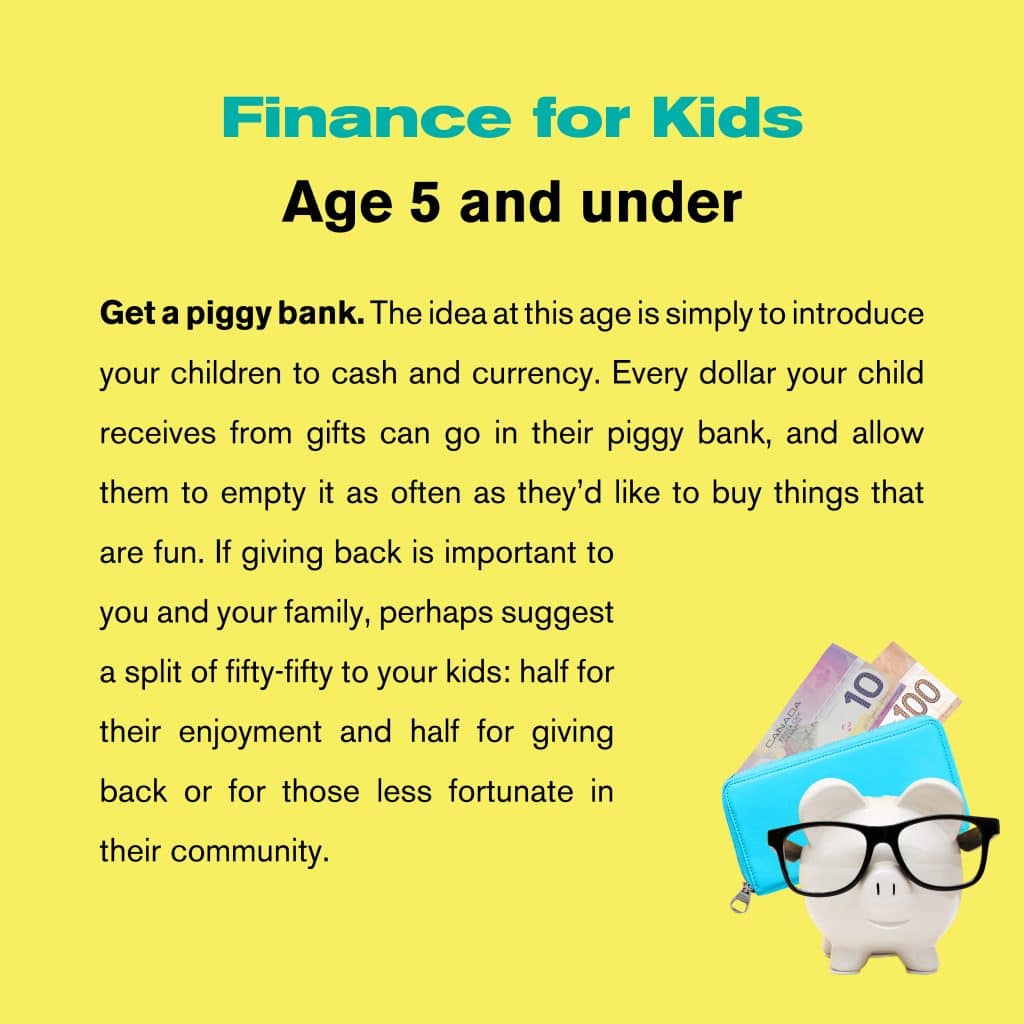
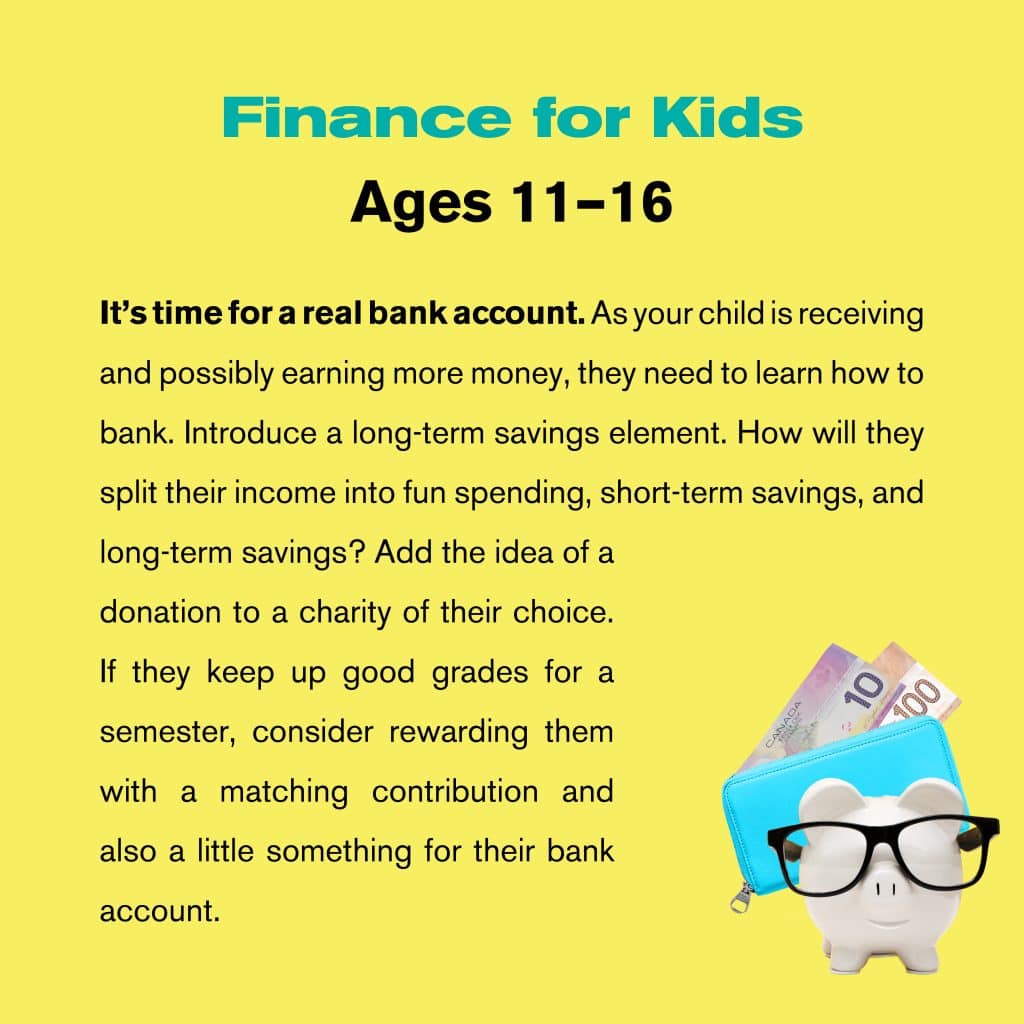
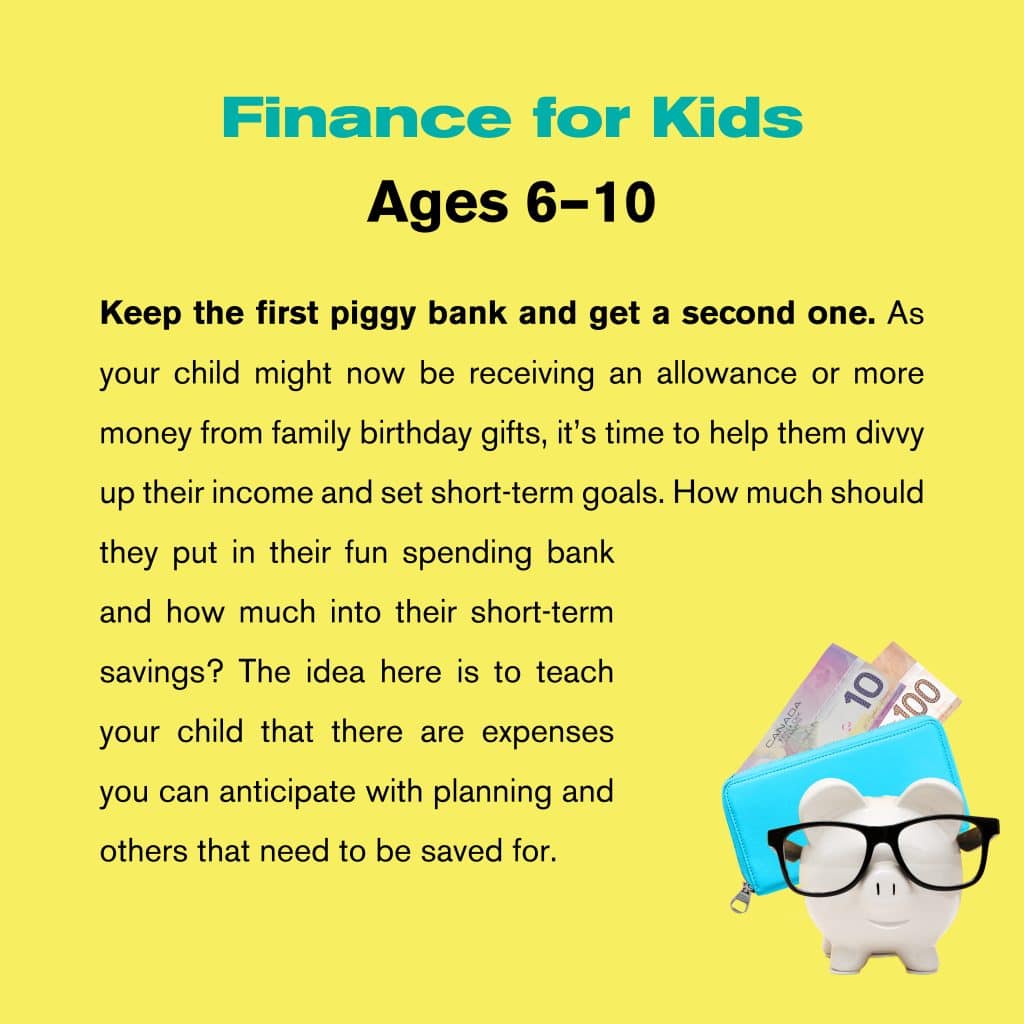
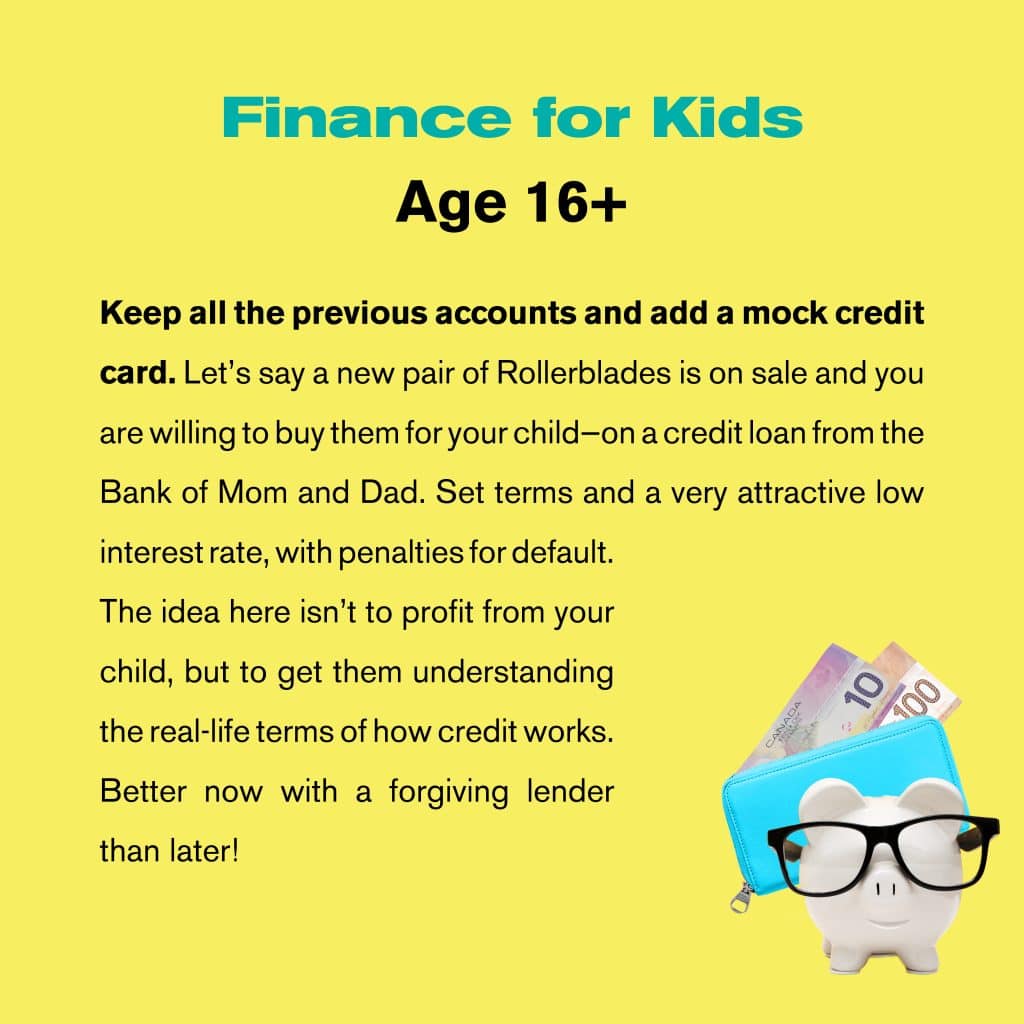
Recommended resources for teaching kids about money
There are lots of resources out there to help y'all teach kids virtually money, from printouts to games to guides, and more. Some of these are geared a fleck more to the United States, merely the foundational lessons remain the aforementioned! Just brand sure that when practicing, you lot utilise Canadian bills and coins.
For starters, the Bank of Canada Museum has a whole section of activities and games, including printable exercise money, activity templates (with instructions), a colourable piggy banking company print-out, and an 'Economics of Suppertime' activity about budgeting for centre schoolers. Most of the resource are geared toward teachers, but many tin can exist adapted for ane-on-one lessons with your kid.
You can too find plenty of toys like play coin (for example, this set from Amazon) or toy cash registers to help your youngest kids.
Additional Resources
Here are some extra resources for yous to explore that might be perfect for your kids.
- Peter Pig's Money Counter is an app game (merely available for iPhone and iPad) that helps teach kids ages iv+ well-nigh making budgets and setting money aside.
- CPA Canada has free interactive online financial literacy workshops for grades 4-12. You lot can download workshop materials and view the workshop presentation online.
- WorksheetWorks.com take a section of printables covering basic coin problems, like making alter.
- Pause out a lath game! Endeavor the archetype Pay Mean solar day or a coin counting game like Coin Bags.
- Math feet is VERY real, and it'due south often tied to a bad experience with math as a kid or young adult. Feeling nervous or panicked about math can have an bear on in how you handle your finances in the hereafter. If you think your child can handle it (and if y'all think you lot can be patient in helping them), Scholastic Canada has tons of PDF math printables for all ages.
Books to help parents teach kids nigh money
1 book we recommended in our article near investing books is Raising Money-Smart Kids: How to Teach Your Kids About Coin While Learning a Few Things Yourself by Robin Taub.
A CPA, Taub originally her book through CPA Canada in 2011 and published an updated version in 2020. Taub outlines each life stage, acknowledging our increasingly mobile and cashless globe. Her goal is to explain why it's important to teach kids virtually money, the best ways of explaining these topics, and a detailed wait at the key topics for each age.
Another book that's on our radar is Money Savvy Kids: The Best Means to Teach Your Children About Coin For a Strong Financial Future past Gordon Pape and Deborah Kerbel. Pape is one of Canada's leading personal finance experts, and he has a number of books under his belt. Kerbel is his daughter, and together, they talk about educational activity the value of money, whether allowances are actually a good thought, teaching smart shopping skills, and saving for college or academy. (Note: This volume is from 2013, so while most of the practical data is however relevant, the earth is a bit different now!)
Takeaways
Teachable moments exist in all aspects of childhood — peculiarly when working at building your child's fiscal skills. Making sure they have a solid foundation when it comes to money involves not only making sure they tin summate sales taxes or set aside function of their assart. It's nigh instilling confidence.
Work these coin moments into mean solar day-to-day life. After all, we utilize coin literally every day! Answer the questions your kids ask and talk through even the potentially uncomfortable conversations. Keep it positive, stick with it, and before long, their financial literacy will be soaring.
Your financial state of affairs is unique, and we tin can help you notice the best counselor for your needs. Just fill up out our curt questionnaire.
When Do Kids Learn About Money,
Source: https://advisorsavvy.com/teach-kids-about-money/
Posted by: taylorsomint.blogspot.com


0 Response to "When Do Kids Learn About Money"
Post a Comment